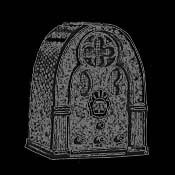Secrets of Scotland Yard was the older step sister to The Black Museum. Both series were independent productions created by the Towers Of London syndicate and intended for world-wide distribution. Secrets eventually aired in the USA on the Mutual network in 1957 (Archive.org). Both series featured a famous actor as the host. Orson Welles hosted The Black Museum, and Clive Brook, who played Sherlock Holmes in the 1932 movie of the same name, hosted Secrets for the first year or so. Then Brook was replaced with a cheaper actor who played the role of "Superintendent X" (Archive.org). Both series also recreated real life stories from Scotland Yard, including the (often gory) details of the crime and the evidence that led the police to the culprit.
Some of the crimes and trials were quite famous, like the theft of the British Crown Jewels, or even the unsolved murder case of Jack the Ripper. Knowing that the crimes and punishments on Secrets of Scotland Yard were real certainly added a gruesome yet fascinating dimension to the proceedings that fictional murder stories could only dream about. It proved that truth can be stranger (and therefore, more frightening) than fiction.

An Opening Narration:
(Dramatic Music: )
Announcer: "How do you do? This is Clive Brook. Of all murderers, perhaps the poisoner is the cleverest and most difficult to catch. There is something peculiarly horrible about a man or woman who uses poison. Theirs is a premeditated crime, and once caught, they have little hope of reprieve. The story I'm going to tell you today concerns a man respected and liked within the community he lived. An officer, he served in the first world war. A clerk to the local justices of the peace. And apparently in every respect, a man of integrity and a worthy citizen.
(SFX: Creepy music starts to build underneath narration.)
"November 1921. A confidential letter had been received at the home office from Doctor Tom Hinks, who practices in the little market town of Hay on the border of Wales."
Dr: "I'm only writing this letter after the most severe conflict in my own mind. To cast suspicion on a fellow human is, I fear, a terrible thing to do. Particularly when he is a well liked friend. And yet, I must do my duty and I have no alternative..."
A Typical Closing Narration (Spoiler Alert!):
Brook: "Armstrong was a gentleman by education. He was a popular fellow who had won the affection of his friends and neighbors. And yet, there he stood at the bar of judgment, convicted of slowly poisoning his wife who had loved and trusted him. Armstrong had held a commission the Army, and had been proud of the uniform he had dishonored. When he was asked if he had anything to say why he should not be given the judgment to die, he squared his shoulders, took one pace forward like a soldier on the parade ground, then stood upright and rigid. 'Nothing,' he said, in a crisp voice. He heard his sentence, then took a parade ground right turn, brought he heels together with a click, and marched off, left foot first, looking straight ahead to the steps leading to the cells.
(SFX: Music builds underneath.)
"No object would have been served by charging Armstrong with more than one murder, but if it had been necessary, it is probable that proof could have been obtained that he poisoned at least three other people before he murdered his wife. His murders were cowardly, and yet, he died like a brave man. He was executed at Gloucester Prison, and those who were with him to the end, had to admire his calm fortitude."
An Alternate Opening (from Superintendent X):
Host: "You remember 1944 of course, that critical 5th year which was to see the beginning of the end for the greatest and most destructive war in history. You remember the daily headlines? The latest progress on this front or that, a naval battle here, a mass bombing raid there? Pictures and maps, official communiqués, eye witness accounts, claims and counter claims. Any story not bearing on the war had to be good in those days to reach the front page. Even the most horrific murders that would have normally earned screamer headlines, were often dismissed with a few paragraphs and tucked away someplace in the back. But there are some stories that will always be BIG news. And when in March, 1944, four people stood their trial at the old bar in London for the offense against the Witchcraft Act of 1735, public interest reached a fever heat that for a few days, the war took second place.
Let's go over the story again now, shall we? Let's see what it was that set legal experts delving among old and half forgotten laws, finally to unearth one that spoke darkly about such things as sorcery, enchantment, and conjuration."
(SFX: Music creeps in underneath.)
Hear it now, FREE!
(Courtesy of Archive.org)
Hear 57 episodes free here.
Sample shows:
"Poisoner" - A respected Clerk of Court is brought before the same court that he served, accused of poisoning his recently released wife from a mental institution.
"Dr Ruxton, Ax Murderer" - A well loved doctor is arrested for chopping up his wife and 20-year-old servant into 200 pieces of carnage.
"Buckets of Blood" - A 1726 case is recounted, involving the grisly discovery of severed heads in the river Thames.
